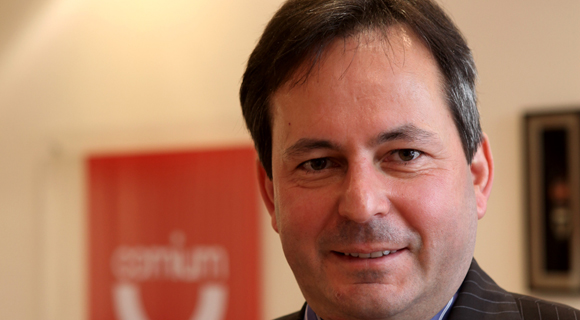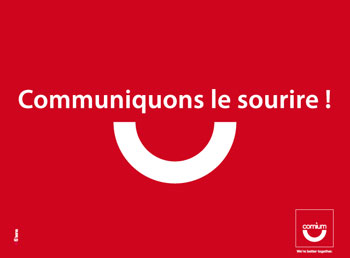Comium Côte d’Ivoire: Close To The People
Michel Hébert, Chief Executive Officer of Comium Group (Koz)
Comium Côte d’Ivoire is one of the mobile operators in the Côte d’Ivoire market. Upon reaching its fourth anniversary, the company has had terrific growth since its launch. Mr. Hebert says Comium is closer to the people – to the Ivorians – than any other operator…
Interview with Michel Hébert, Chief Executive Officer of Comium Group (Koz)

What are the opportunities and challenges of the Ivorian ICT market and how is the government’s latest ICT plan viewed?
First of all, the government’s latest ICT plan can be achieved within a 10-year time frame. Aside from having faced a severe political and civil conflict, Côte d’Ivoire also has challenges in terms of infrastructure, so it has fallen behind. However, with the investments and the willpower of the government, it can be done. The economy is very strong in Côte d’Ivoire and the country has a lot of potential in regards to resources, which will attract investors now that the situation is beginning to stabilize.
A lot of telecommunication companies will come to Côte d’Ivoire to invest in the infrastructure, something that Comium will do as well. If the proper infrastructure can be put into place, like fiber optics, and if the latest technologies, like 3G and 4G, can be brought here, a knowledge economy will emerge. Once those basic needs are met, the rest will follow.
How would you quantify the potential of the telecommunication industry in Côte d’Ivoire?

There can be a good return on investment, around 20% and 30%, which is feasible for this kind of country and economy. Comium has experienced something close to that. In terms of mobile penetration, the Minister mentioned that it was somewhere around 70%, which would amount to around 16 million people in a country of 21 million.
Although it may seem like a high percentage, it’s actually quite low. Most subscribers have two or three phones or one or two phones with two or three SIM cards that they alternate depending on who has the best offer. In reality, the number of people who have a mobile phone is most likely around 30% or 40%. This statistic means that the market is not over-saturated and that there is space for growth. Some other African countries have a higher penetration rate than Côte d’Ivoire and are still growing, like Gabon, which has more than 100% penetration rate. Smart phones are becoming especially popular.
It would be wrong to think that these kinds of phones are only for rich people in rich countries. In Côte d’Ivoire, one sees a lot of Blackberry’s and iPhone’s, not to mention iPad’s, which are taking off as well. New technologies attract a lot of people in the country. People are hungry for them.
The vision of the ATCI is to have three integrated/converged telecom companies on the market, which will provide mobile, internet and fixed line services. Currently, the market is served by 5 active telecom operators and there are 7 licensed companies. How will you structure your strategy regarding the vision of ATCI?
There should be three or four operators, but it will depend on each company’s strategy. As for Comium, the company has been getting closer to the people, particularly the Koz brand. Of course, Comium feels close to people as it offers better value for money than its competitors, which will translate into better technologies in the future. Other companies might offer business solutions, but Comium thinks it can meet the needs of the masses.
There were harder times, like there were for everybody. We went through crises and difficult political changes, but despite all that, Côte d’Ivoire is a country with a lot of potential. We believe, and this is why we invest.
First of all, Comium has very good penetration in the populated areas of the country. Secondly, Comium believes it can be first in certain products like prepaid tablets. Excluding Blackberry’s and iPad’s, there are other applications and technologies, like Android products, that Comium may want to adopt and can offer to the market better than its competitors.
What would you advise the regulators to do to facilitate your operations while bringing more quality to your customers?
There are two main areas where regulators may want to focus. One area is preventing dominant operators from being dominant operators to allow the market to open up. No matter what kind of tactic one may have, some dominant operators just cannot be outdone. In those instances, the government should step in and try to balance matters to favor everybody.
Also, Comium would like to see number portability. Some people have had the same number for years which prevents them from leaving, and that doesn’t give them much of a choice. They might stay with an operator they’re not happy with simply because of that fact. Comium thinks that number portability could bounce the market.
Can you give us a brief history of Comium and an overview of your future goals and strategy?
Comium is a group that grew out of LibanCell, one of the two operators in Lebanon for a number of years following the civil war. After it was sold back to the government, its owners decided to invest in some African countries, Côte d’Ivoire being one of them. In the GSM mobile business back in 2003, Comium invested in Liberia and then in Sierra Leone. In 2007, Comium invested in Gambia and started its operations in Côte d’Ivoire. Comium is still looking for licenses that will allow the company to continue and grow and get close to the people.

Upon reaching its fourth anniversary, Comium has had terrific growth since its launch. The company now has over 1.6 million subscribers and is still growing at a rate of 10% or 15% each year.
How would you like to approach investment and how will you attract investors?
It will be simple to attract investors to Comium. Right now, Comium has more demand than supply and more customers wanting their SIM cards than what they can give. The network has expanded, but there is still work to do. Today, Comium only covers 50% of the population, and if Comium can cover 70% or 80%, they can quickly grow in market share. This huge demand that the company gets everyday can be very attractive to investors. The country went through a lot because of the crisis, and this has caused a lot of investors to think twice before investing more into this business.
Yet the crisis has ended. The situation is improving and stabilizing. Both Comium and its investors believe that it is time to start investing again.
From your experience here, what are the main challenges in operating this market?
Rule and regulation enforcement is not an easy task. Of course, the government is working on that right now and progress is being made. Infrastructures need to be improved as well – not just in telecommunications, but also in the roads, the bridges, and so on. For instance, if one installs equipment in remote villages or needs to fix that equipment, it’s very difficult and expensive to get there, considering the wear and tear of the vehicles and the time and people it takes. Improving infrastructures will help facilitate the company’s operations in the market.
The government has announced major improvements in the construction sector. The company can already see it happening, which we are very pleased with. But we still need to progress much further in order to link the rest of the country. Investment has to continue with all the arteries in the country.
How do you approach social/corporate responsibility?

Over the last few years, Comium has become close to the people for two reasons. First of all, the company entered the market offering more value than its competitors. Frankly, Comium lowered prices quite a bit. Others may have followed, but Comium was the first to do it, and that opened up business for the company. Put simply, this is how Comium made the mobile phone more accessible and close to the people.
Comium has also been extremely strong in sponsorship – not just events, trade shows, and dinners, but also some corporate responsibility type of sponsorships. To this day, Comium sponsors vaccination campaigns, donations to hospitals especially after what happened this year, community centers, children’s charities, and orphanages, which is recognized and appreciated in a country of need. Furthermore, we sponsor musical and artistic events. This makes us so close to the population.
Making it more affordable for Ivorians to communicate and assisting them in their needs and in their culture every day is what made us so close to the people.
What is your final message?
In short, Comium’s experience in Côte d’Ivoire has been very good. There were hard times, but that was the case for all involved parties. Côte d’Ivoire went through crises and difficult political changes, but despite all that, Côte d’Ivoire is a country with a lot of potential. Comium belives in the country and this is why we invest. Up until now, Comium has seen return on its investments and they are certain that there will be more in the future. The country will regain its place in West Africa and be the model that other countries will follow. Comium has a lot of confidence in Côte d’Ivoire and everything that goes on in the country.